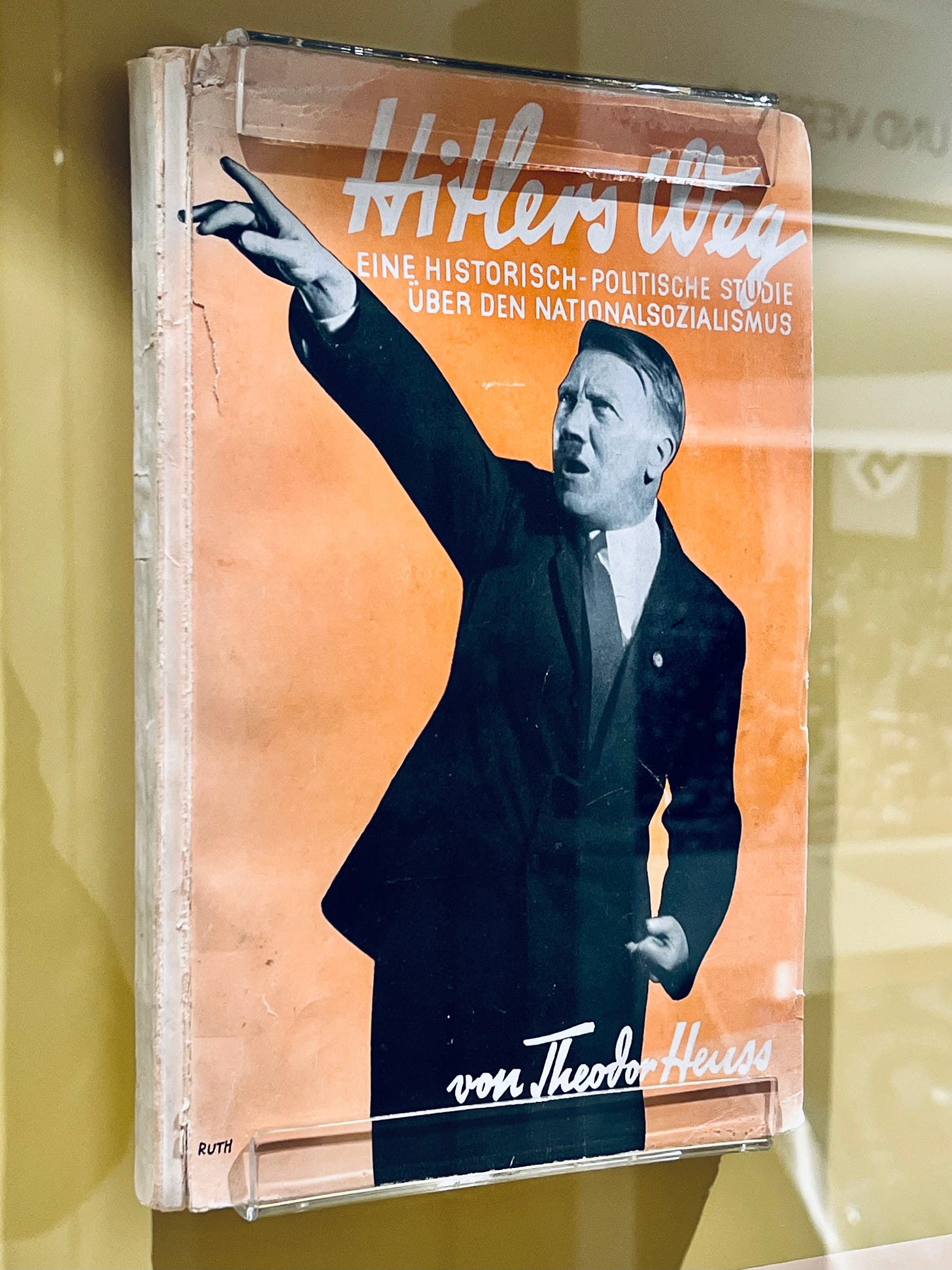When the defenders of democracy were too late
#262
My Dear Friend of Democracy,
I met Theodor Heuss the other day. Well, not actually. He died a while ago (on 12 December 1963).
But I was at the house he had lived in Stuttgart, Germany.
Today, it is a museum.
It is worth a visit (if you can speak German, because I found no English translations there). You do not only learn about Theodor Heuss as a person but also about the time in which he lived.
He grew up in the German Reich (* 31 January 1884), he experienced the First World War, the Weimar Republic, Nazi Germany and the second German democracy where he served as the first Federal President (1949-59) of the Federal Republic of Germany.
What I learned as I walked through the exhibition in the simple two-storey house, which was built in the sober, restrained style of the post-war period was how steadily and intense Theodor Heuss had fought against the rise of National Socialism. In speeches as a member of the Reichstag. Also, as an author. His study "Hitler's Way" (Hitler's Weg), published on 1 July 1932, was a huge success and was translated into three languages.
In his book, Heuss warns against the brutality of the Nazis and their ideology.
So everyone in Germany could have known what the Nazis were planning (even if the reality ultimately exceeded all pessimistic predictions).
However, Hitler wasn’t stopped.
Why?
Because people didn't believe the warnings. Also many wanted what the Nazis delivered.
In the end, the Nazis abolished democracy using the means of democracy.
The decisive step was the so-called Enabling Act (Ermächtigungsgesetz).
The Enabling Act of 1933, officially titled "Law to Remedy the Distress of People and Reich" (Gesetz zur Behebung der Not von Volk und Reich), was a law that gave the German Cabinet – most importantly, the Chancellor (then Adolf Hitler) – the power to make and enforce laws without the involvement of the Reichstag or Weimar President Paul von Hindenburg.
The numbers on the abolition of democracy: 444 voted for the Enabling Act, 94 voted against, and 109 were absent.
Theodor Heuss was one of the 444. Perhaps the worst decision in his life. However, Heuss didn't vote in favour of the Enabling Act to support Hitler. But because he saw it as the only chance to integrate the Nazis into the democratic legal system. Cause a coup by the Nazis was to be expected.
But Heuss was wrong. After Hitler had enough power he made short shrift of democracy.
Perhaps democracy was beyond saving at this point anyway.
Nevertheless, voting for the Enabling Act was a mistake. Hitler could create the impression that he had come to power legitimately. As if the people had wanted to abolish democracy.
This was not the case. Not even in Nazi Germany, where there was indeed great enthusiasm for Hitler.
Ultimately, Hitler seized power through a de facto coup. For months, his thugs had prepared the ground for the success of the Enabling Act.
What can we learn from this?
✊ Democracy must always remain defensive. This includes recognizing early on who intends to abolish democracy. That isn't easy. Proof that a group wants to overturn democracy can only be provided once democracy has been abolished. Therefore, circumstantial evidence must suffice to take measures to protect democracy. When we are certain about the enemies of democracy, it is too late. Theodor Heuss and so many millions of other people with him had to terribly experience this.
See you in Democracy,
Johannes
📸 Stuttgart, Germany / 21 December 2024



I am not so sure about not being certain about the enemies of democracy until it is too late. Do they not tell us beforehand clearly what they intend to do? Trump is one recent example. I'm inclined to think it is that a large block of the populace simply ignore the message or perhaps does not even value democracy.
"Well roared", Johannes, that is one of many reasons why I have been reading Sebastian Haffner (Geschichte eines Deutschen, Notizen zu Hitler, Winston Churchill and Von Bismarck zu Hitler) again and again for years. Thanks for the tip, which I didn't know yet.